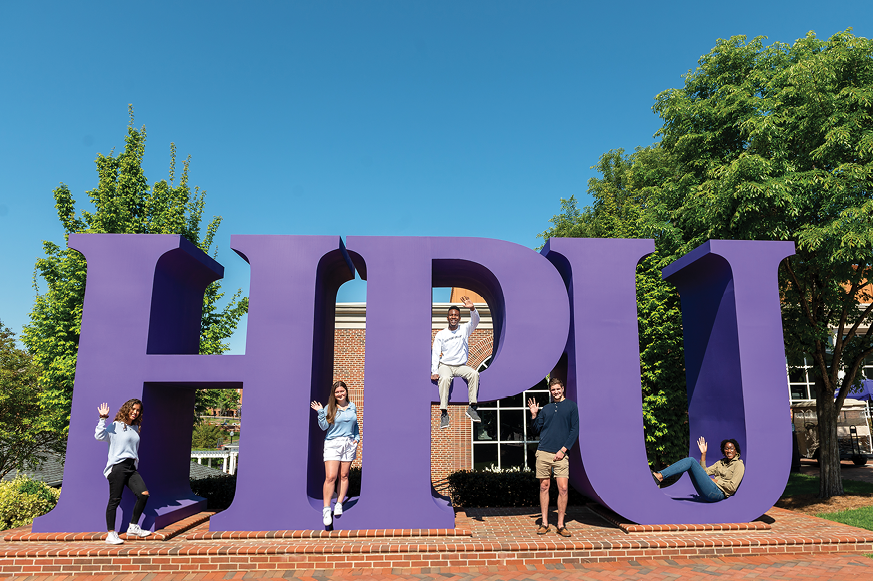- Home
- Media Kit
- MediaJet
- Current Issue
- Past Issues
- Ad Specs-Submission
- Ad Print Settings
- Reprints (PDF)
- Photo Specifications (PDF)
- Contact Us
![]()
ONLINE
![]()
ONLINE

Transformation
Editors’ Note
Dr. Nido Qubein became the seventh president of High Point University in January 2005. Since that time, enrollment has quadrupled, campus has expanded from 90 to 520 acres, and academic schools have grown from three to 11. He came to the United States as a teenager with limited knowledge of English and only $50 before going on to build business partnerships in banking, real estate, publishing and retail businesses. Prior to his role as HPU president, Dr. Qubein rose to prominence as an internationally known author and consultant who has given more than 7,500 presentations worldwide. He serves on the corporate boards of several Fortune 500 companies including Truist, the sixth largest bank in the nation, La-Z-Boy and nThrive Healthcare. Dr. Qubein is also executive chairman of the Great Harvest Bread Company. Among numerous honors and recognitions he has received, Qubein is an inductee of the Horatio Alger Association for Distinguished Americans, along with Oprah Winfrey and Colin Powell.
University Brief
Founded in 1924, High Point University (highpoint.edu) is a 98-year-old liberal arts institution located in the Piedmont Triad region of North Carolina. “America’s Best Colleges” 2022 Edition, published by U.S. News & World Report, ranks HPU #1 among all regional colleges in the South (the tenth consecutive year at #1). It also ranked HPU for the seventh consecutive year as the #1 Most Innovative Regional College in the South for innovation in curriculum, faculty, students, campus life, technology and facilities. HPU was named, for the eleventh consecutive year, to the national “Colleges of Distinction” list. HPU also earned Fields of Study distinctions for the Phillips School of Business and the Stout School of Education. High Point University has been named one of the nation’s top institutions for undergraduate education by The Princeton Review. HPU is recognized in “The Best 387 Colleges: 2022 Edition” for its academic programming, as well as positive survey responses and feedback from students, parents, and higher education leaders across the country. In addition to including HPU in “The Best 387 Colleges,” the new Princeton Review rankings recognized HPU in the Best Southeastern Colleges “2022 Best Colleges: Region by Region” list, as a Great School for Business/Finance Majors and a Great School for Communication Majors, and for Great Dorms.

High Point University students at Qubein Arena
How do you define High Point University’s purpose?
High Point University’s purpose is to prepare students to thrive in the world as it is going to be. That’s why we focus on developing life skills and fostering the values of God, family and country. In a word, our purpose is transformation. When you equip students with a growth mindset and ensure that decision-making is based on values, that’s when students transform into leaders. I remain as passionate about our work today as I have ever been.
How is High Point University preparing the next generation of leaders with the life skills and entrepreneurial spirit needed for success?
You can’t just lecture young people and hope they learn something. High Point University has created a distinctive, intentional environment that inspires students to want to succeed. Throughout our campus you see our call to action: Choose to be extraordinary.
And more than merely seeing this declarative statement, you can feel it. It’s what students and families remark on the most. We have a culture that must be experienced to be understood. HPU is a positive place. We don’t harp on what’s wrong with the world. Instead, we focus on the positives. We focus on the opportunities our nation provides, and we encourage our students to transform their lives and transform the world. I came to this country as an immigrant at the age of 17. I’m not shy about reminding our students that there are millions of people around the world that want to come to America. You don’t see people wanting to leave. Sometimes it takes an immigrant to remind Americans about the blessings that exist in this nation. It’s not a perfect nation – there is no such thing. But oh my, how I appreciate the opportunity to encourage our students to take calculated risks, work hard, give back, and go out and make our world better.
Do you feel that entrepreneurship can be taught or is the entrepreneurial spirit something a person is born with?
I believe you can encourage people to take on an entrepreneurial, growth mindset. However, that doesn’t mean everyone needs to be an entrepreneur. Philanthropies, schools, churches all need entrepreneurial leaders. Having an entrepreneurial mindset is not about building a widget and selling it. Having an entrepreneurial mindset is about building value and rendering value for your client, customer, congregation, student – you get the idea.
At High Point University, we attract entrepreneurs and entrepreneurial leaders to coach and inspire our students. The co-founder of Apple Computer, Steve Wozniak, is our Innovator in Residence. Netflix co-founder Marc Randolph is our Entrepreneur in Residence. Domino’s Pizza President and COO Russell Weiner is our Corporate Executive in Residence. Cynt Marshall, the Dallas Mavericks President, is our Sports Executive In Residence. And John Maxwell, renowned leadership expert, is our Executive Coach in Residence. In addition to our stellar faculty, we bring real-world practitioners to campus to teach our students. It creates a powerful learning environment that ultimately demonstrates to students that they, too, can achieve extraordinary results in their lives.

Students at High Point University hail from all
50 states and more than 30 countries
Will you discuss High Point University’s commitment to supporting its students, faculty and community during this unprecedented time?
HPU is focused on rendering value. When the pandemic hit, we had a new challenge to overcome. Our students and parents made it abundantly clear that they wanted classes to be held in person – a testament to our faculty mentors and inspiring learning environment filled with state-of-the-art classroom technology and labs, as well as fun student centers where students hang out, eat and study. So we developed a Health and Safety Task Force and quickly implemented plans that balanced both the in-person learning that students deserve along with the health and safety of our entire campus community.
We didn’t whine about the conditions; we merely went to work. We secured hundreds of hotel rooms in preparation for quarantine and isolation protocols. We resourced faculty in order for them to safely teach in person. We leveraged technology so that we could assist students that were temporarily placed in quarantine. We did what we needed to do to best serve our students. We remained open the entire 2020-2021 academic year and have remained open ever since – including our largest enrollment ever in the Fall of 2021. We are blessed and grateful for the hard work and commitment that our faculty and staff displayed. Our students and parents took note.
Now, what I’m most proud of is the modeling of behavior that the HPU community displayed. When I think about all the shutdowns, chaos, arguments, confusion, etc. that has taken place in our nation and world as a result of the pandemic, and I compare that to what our students observed with regards to how HPU handled it – WOW! That is how you develop life skills. Our students lived and learned through our actions. They saw that HPU didn’t panic, acted responsibly and stayed focused on our mission. Those are lessons they will carry throughout their lives.
What do you see as High Point University’s responsibility to the community it serves and to supporting the needs of the community?
When I accepted this position as president in 2005, the first action I took was to declare to the city of High Point that HPU was High Point’s University. I held a press conference and luncheon and told community leaders that HPU would not survive if the city didn’t support it, and I reminded the city leadership that HPU had the potential to lift the community up for a better tomorrow.
Now, some 15 years later, HPU has been a blessing for the city, and I’m grateful that HPU has played a critical role in revitalizing many aspects of High Point, North Carolina. We’ve led the downtown transformation by raising the funds to purchase a professional baseball team and securing naming rights for the new stadium, all of which has served as a catalyst for continued development in downtown High Point just blocks away from HPU. High Point University also attracts more than 100,000 visitors a year from across the United States and from dozens of nations and generates $765 million in annual economic impact.
So, yes, it is important that HPU serves as a leader in our community. There’s a scripture we have displayed in the grand lobby of the Hayworth Fine Arts Center. It’s Luke 12:48 – To whom much is given, much is required. That perfectly defines our values regarding HPU’s leadership and participation in the city of High Point.
What are the keys to effective leadership and how do you describe your management style?
A leader must define a clear vision, develop a solid strategy, execute consistently and interpret value. These are the fundamentals of effective leadership. It’s what I strive to focus on in all my work.
My management style is summed up very simply: Inspect what you expect. I’m in university Facebook groups to see what our families are thinking. I want to add value for them, so I don’t wait for my team to tell me. I walk campus and inspect our facilities for cleanliness, order, and yes, even to assess the energy our campus creates to help propel our students forward. I asked our team to put an outdoor ice rink on campus during the pandemic. I wanted something safe and fun. That would have never happened if I stayed at my desk all day simply making calls and managing e-mails.
I meet with faculty and staff frequently to learn more about their areas of focus and to ensure the university is appropriately allocating resources. A leader can’t allocate resources effectively without a vertical and diagonal understanding of each business unit.
Ultimately, I make myself available to students, parents, faculty, staff, alumni and the community. I answer my e-mails – it’s not delegated. If I’m going to make decisions about the future of the institution, then I have to believe I’ve assessed the risks and understand the potential benefits of those decisions.
What advice do you offer to young people beginning their careers during this uncertain time?
Be brave. Don’t be afraid to try something, to take a calculated risk and join an organization and commit to contributing value. Today’s culture isn’t good at delayed gratification. We are sold the idea we can have it all and we can have it now. It’s not reality. There is no substitute for hard work, pushing through adversity, staying positive, committing to lifelong learning and expressing your gratitude for those that help you along the way. These are the timeless life skills that create sustainable leadership. The good news is that these traits, skills and behaviors are available to everyone.![]()